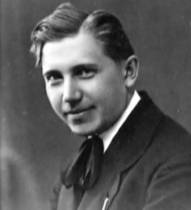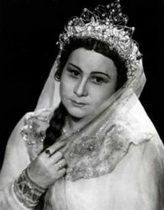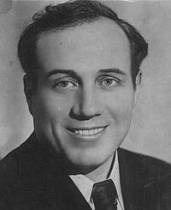 Nikolai Semyonovich Golovanov (21 January 1891 – 28 August 1953) He conducted the premiere performances of a number of works, among them Nikolai Myaskovsky's sixth symphony in May 1924, and recorded operas and concert works by Glazunov, Mussorgsky and Liszt among others. Golovanov held some of the highest musical positions in the USSR, including an extensive association with the Bolshoi Opera. In her autobiography, Galina Vishnevskaya terms him the theater's chief conductor, and tells of his dismissal from the Bolshoi and his death - which she attributed to the humiliation of the experience of losing this position. It has been reported that Golovanov's firing was the result of Stalin's displeasure at Golovanov's having tried to use a Jewish singer, Mark Reizen, in the title role of Tsar Boris Godunov in his recording of Mussorgsky's opera. Golovanov actually did record the opera with Reizen as Boris, but later remade Reizen's part with another Boris, Alexander Pirogov. Golovanov's recorded output was substantial and quite individual in interpretive approach. In his discography we find all but one of the Liszt tone poems, the complete Scriabin symphonies and Piano Concerto, Tchaikovsky's 1st and 6th symphonies, as well as shorter works, Beethoven's 1st Symphony, Violin Concerto and Triple Concerto, Rimsky-Korsakov's Scheherazade and his operas Sadko and Christmas Eve, Mussorgsky's Boris Godunov and Pictures at an Exhibition, Rachmaninoff's 2nd and 3rd symphonies, plus the opera Aleko and other compositions, Glazunov's 5th, 6th and 7th symphonies, and scores by Grieg, Mozart and others. Based upon the evidence of his recordings, Golovanov's characteristic performance mode was full-blooded and nearly vehement in tone, with a powerful, almost overloaded sense of sonority, and extreme flexibility in matters of tempo, phrasing and dynamics. Golovanov was also a composer; his works include the opera "Princess Yurata", symphonies, two symphonic poems, orchestral suites, overtures on Russian themes, over 200 Romances, arrangements of folk songs, and a number of choral religious works. He was a well-regarded piano accompanist in the early years of his career. He was married to the soprano Antonina Nezhdanova.  
Yelisaveta Shumskaya Ivan Kozlovsky
*************************** Peter Ilyich Tchaikovsky "Moscow" Cantata
Daniil Demyanov, bariton Ludmila Legostaeva, mezzo 1948
Festival Coronation March in D major
1949
Marche slave, Op. 31
1944
1812 Overture, Op. 49 1948 Francesca da Rimini, Op. 32 1949 The Storm, Op. 76 1948 Romeo and Juliet "Duet" Ivan Kozlovsky, tenor Yelisaveta Shumskaya, soprano 1952 Concerto for Piano No. 1 in B flat minor, Op. 23
???????????
(Stockholm Pilharmonic Orchestra, cond. Ehrling, 24.02.52)
Emil Gilels, piano
1946
Symphony No. 1 in G minor, Op. 13 1952 Symphony No. 6 in B minor, Op. 74
1948
All-Union Radio Committee Grand Symphony Orchestra Choir of All-Union Radio Committee Grand Symphony Orchestra N.S. Golovanov
***************************
(Coronation March, Marche slave, Piano Concerto)
Записи из личной коллекции.
| 
